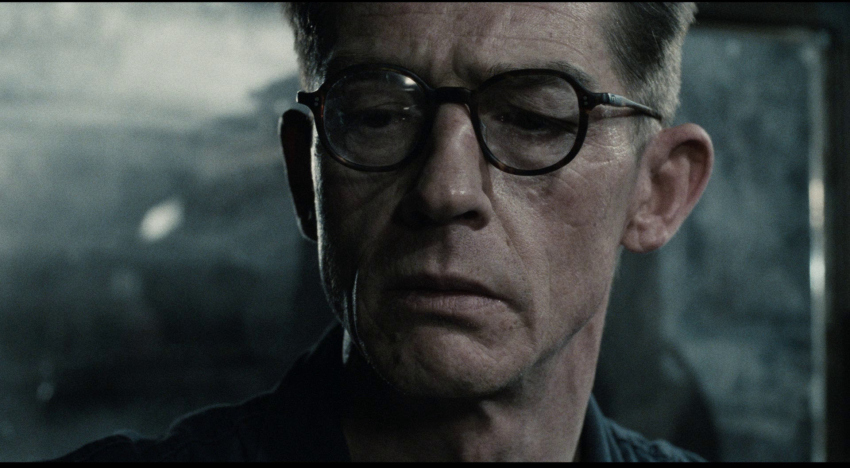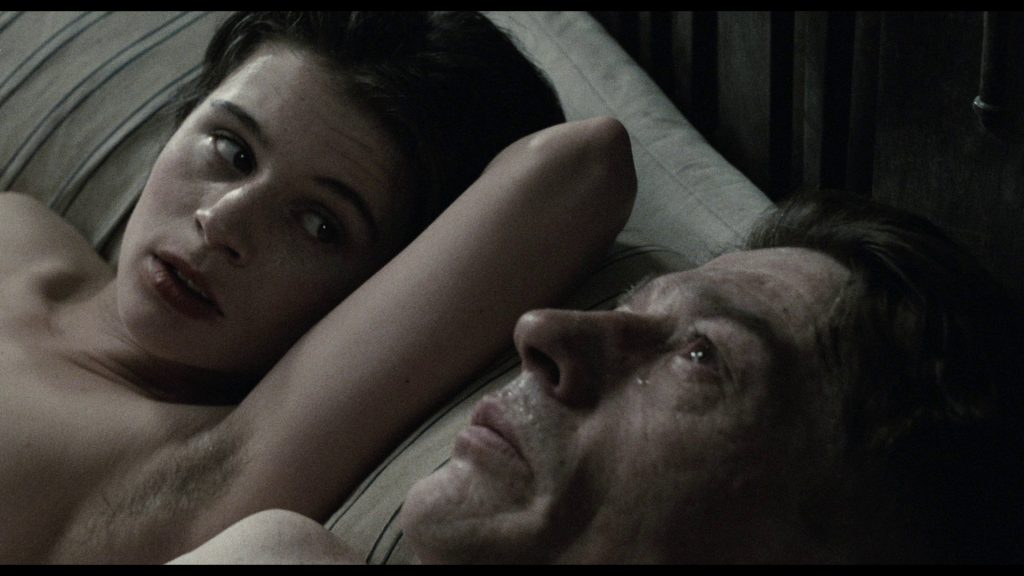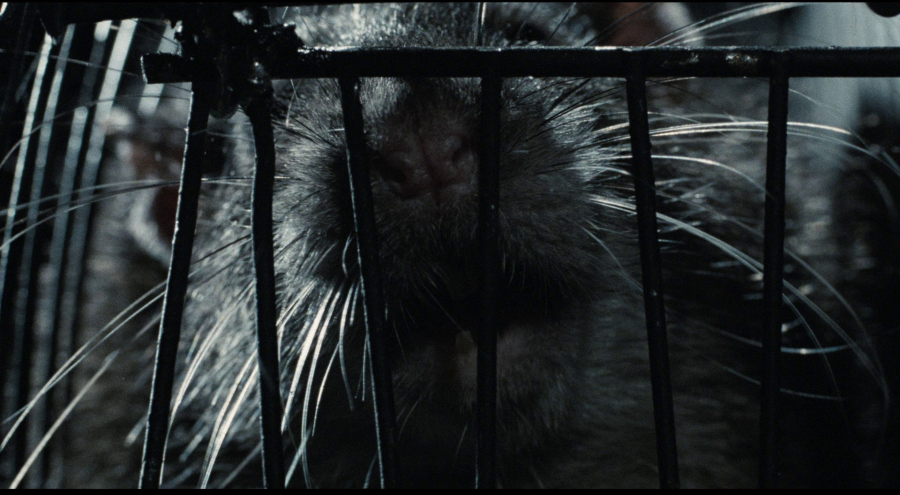Warning: Spoilers Ahead
Nineteen Eighty-Four: A Novel (George Orwell, 1949) has remained in the public consciousness for decades. Given the age in which we live, its prominence in current culture has grown larger, with many of the social and political woes of today often compared to the work by Orwell. This is where the film adaptation, 1984 (Michael Radford, 1984), returns to the spotlight. Even upon its release, the film’s depiction of the book’s dystopian reality drew criticism for not diving enough into the original’s thought-provoking messages. As someone who has not yet read the novel, I hoped my fresh eyes could see positive and redeeming qualities that many past viewers had overlooked. However, after having viewed the film, I did not see a world that served as a dark warning about a party’s control over the populace, but rather a world populated by whittled-down concepts and missed opportunities. As a result, the film’s adaptation of the award-winning cautionary tale presents, from a qualitative perspective, only half of the book’s sharp writings, while the rest feels generally underwhelming.
The film follows Winston Smith (John Hurt), who lives under a totalitarian political party named Ingsoc, which rules over the fictional superstate of Oceania. Winston goes about his day-to-day life, with the job of rewriting history from old newspapers, while secretly keeping his critical thoughts about Ingsoc and “Big Brother” to himself in a hidden journal. Around every single corner, in every room, on every desk, sits or hangs an Ingsoc Telescreen, which constantly projects pro-Ingsoc propaganda and manufactured updates on Oceania’s war against its supposed enemy, Eurasia. Despite the looming presence of the Thought Police, a group that apprehends people who commit “thoughtcrime,” Winston still has desires for a world better than the one he is trapped in. Eventually, he secretly develops an intimate relationship with a woman named Julia (Suzanna Hamilton). As a result, his constant search for his true identity outside the walls of the oppressive regime leads him on a collision course with the members of Ingsoc, and their goal to rewrite the very nature of their subjects’ personalities to remain in power.
The defining halves of this film vary greatly in quality. One embraces much more of Orwell’s dark concepts, and the other feels like a generic dystopia movie people have seen a million times before. This boring piece of the film, the majority of the runtime, is found in the film’s literal first half. While the first sequences are good for establishing the world and tone, the remaining time before the halfway mark draws little from the details and world-building the original novel was known for. With a runtime under two hours, it is understandable that some corners needed to be cut for the sake of pacing and compactness. However, the systems of this world, many aspects of which were important to how Ingsoc keeps its subjects in line, are quickly mentioned once and never incorporated into the film again, almost as if the film forgot to. A few examples of this are the class divisions, position stigmatizations, and how the Telescreens function. The little glimpses of the deeper workings of this reality can somewhat be seen when Winston writes in his secret notebook, or discusses Ingsoc’s social structure with colleagues. Even then, the observations he pens and thinks of are often critiques that most audience members already caught onto from the opening scene, or did not have time to understand because said aspects get quickly abandoned. Even the secret affair with Julia started with little to no buildup, and lacked any deeper connotations other than a sort of rebellion against the system. Their sudden desire for one another does make sense in context of the oppressive nature of Ingsoc the film hints at, but without proper expansion into finer details, the affair does not feel like the proper “rebellion” that it should have been. Their realizations of each others’ deeper thoughts and desires should have had more of both setup and payoff. Without Ingsoc being expanded upon enough, without its work mentalities and social traps being explored, their relationship feels sudden and undeserved.
The general set design lacks any identity and key features outside of the “Ingsoc” labels plastered everywhere. Work environments and other interior areas can feel distinct at times, but anywhere else is just the same rundown rubbled buildings that have been used in countless films before. Oftentimes, said rubble on which Winston walks to/from home and work gave me flashbacks to the hastily constructed and bland District 12 from The Hunger Games (Gary Ross, 2012), which also lacked any distinction from other apocalyptic big-budget movies from around that time period. I sat through the first half of this film, wishing for the film to present a haunting window into the dystopia many people of today fear may soon come to pass. I waited, and waited, and waited for anything to grab me. The arrest of Winston and Julia came just as I was about to completely abandon the last shred of mental engagement I had with the film. The scenes that this event set off regained my interest in a big way, and even brought on a few of the chills I was hoping for.
This second half of its runtime is what sticks in my mind most when thinking back on the film. It differs greatly from its former half with a clear shift in writing and delivery of information. As soon as the torture scene began, with O’Brien (Richard Burton) explaining the purpose of Ingsoc and its methods of keeping people loyal, I got tense with chills. His dialogue about how Ingsoc wants its subjects to think, their reasonings for why thoughtcrime is a problem for them, and the concept of doublethink, while commonplace among those who discuss the novel, were the type of details and concepts that I felt the film, up until then, had been sorely lacking. What I appreciate most is how it manages to succeed in keeping my attention with dialogue alone. Sure, the torture bed made me grip my sides, and the cage of rats gave me goosebumps, but the main focus of this entire section is O’Brien’s brainwashing, divulging the details of Ingsoc’s methods, and establishing for the audience why these practices are so horrifying. I have a greater motivation to read the Nineteen Eighty-Four novel, in full, after viewing the film, as the terms and ideologies that construct this dystopia are what I crave to learn about, to understand how twisted they are. The structure of the latter half of this film is what I had initially expected a Nineteen Eighty-Four film adaptation would be: engrossing dialogue about the functions of a dystopian superstate with just enough depth to get the viewers’ minds turning, without too much to make a film adaption feel antiquated. The final scene sends this movie off in such a disturbing way that few other films I have seen even come close to matching. The scary sight of Ingsoc’s brainwashing of Winston and Julia succeeding, and with such little resistance, put me on edge long after the film concluded. This is what I imagine George Orwell wanted to do. I just wish that the first half of the film had managed to summon similar thoughts and feelings out of me, instead of constant anticipation with little payoff.
After the movie concluded, I felt the shock of Orwellian’s reality consume my mind for a good chunk of time, only to think outside the realm of the second half, and realize how dissatisfied I felt about the film as a whole. This is not to say that aspects such as actor performance, music, etc., are bad. Quite the contrary, as they were great in most regards. The actors’ performances were low key, but very fitting (although I found it distracting how clean many of them looked while being surrounded by dusty rubble); the audio design and mix felt appropriate (with the exception of some vocal audio being hard to discern); and the music (the intended orchestral arrangements) perfectly fit the sadness of the characters and the totalitarian essence of Ingsoc. These aspects are, in some sense, decent redeeming qualities for those who walk into this film more attuned to these areas of filmmaking. However, as an adaptation of a novel that intends to illustrate what such a superstate would be capable of if real, the acting, music, and so forth were not the aspects I personally felt were the most important. Given the source material, I never felt like the characters specifically were the primary focus of the story. As for the true focus, being the social and political commentary and warnings, the first half dropped the ball in terms of getting the audience to think critically about totalitarian regimes and their influences. I understand that, without a character like O’Brien dispensing exposition about Winston’s thoughtcrimes, the nature of Ingsoc, the Telescreens, brainwashing, and so on, it would have felt incredibly jarring, given Winston’s lonely daily routine. However, I genuinely believe the first half of the movie could have delved deeper into Orwell’s writings if it had some sort of Death Note (Tetsurō Araki, 2006)-esque inner monologue to establish out these details. It could get us, as an audience, connected to Winston and his desire to be free of Ingsoc’s constant watching eye, while also being a brilliant incorporation of the concept of thoughtcrime or doublethink. This would be greatly juxtaposed by the lack of inner monologue during the torture scene, as any thoughtcrimes he had before would get stripped away, with only O’Brien’s brainwashing being heard, and other ideas like doublethink being left in the wake. The prior connection to Winston and his deeper psyche contrasted with the lack of anything distinct by the end of the brainwashing would leave audience members more crushed and weary (the intended reaction).
With all these missed opportunities aside, what we ended up getting from this film left me yearning to see this adaptation deliver what was so good in full, rather than just meeting the audience halfway. While I was engaged for a decent amount of its runtime, this film only encouraged me to start reading the original source material. This adaptation, sadly, only presents a portion of the chilling warnings that keep Nineteen Eighty-Four: A Novel relevant to this day. While the book got its readers fearing such a reality ever coming to pass, this movie adaptation, while competent and disturbing at times, lacked anything deeper that could have encouraged audiences to revisit the movie after a first watch. As a result, this film, just like Winston at the hands of the system he lives in, has been and will continue to be left behind.
6/10
Author Biography
Nikolas Schaal is a student at the University of Wisconsin-Parkside working toward a Liberal Studies major with a film focus (since a proper film major did not exist when he started). He loves film analysis and review, but hopes that further experience would give him a wider lens to aid him in understanding films better, as he feels like he has just scratched the surface on what to look at in a film.
Film Details
1984 (1984)
USA
Directed by Michael Radford
Runtime 110 minutes
Blu-ray
USA, 2019
Distributed by The Criterion Collection (region A/1)











































